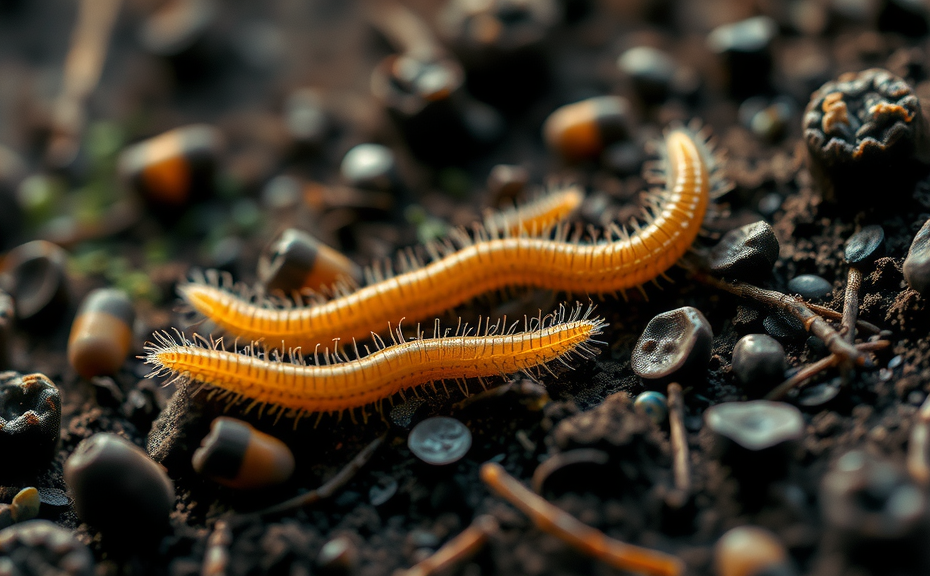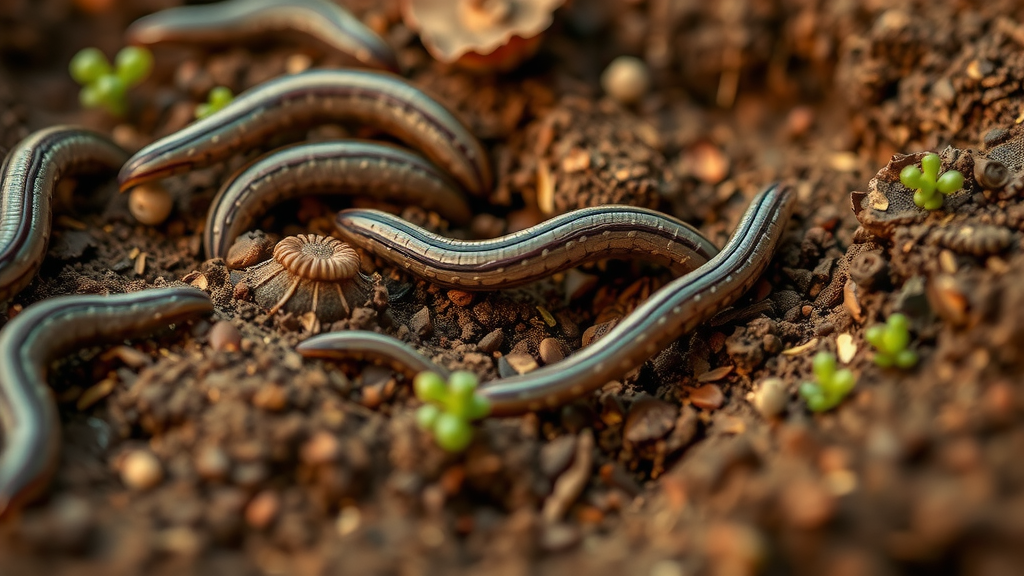These often-overlooked organisms play a significant role in the biological landscape of soil ecosystems. Classified as heterotrophs, these microscopic roundworms obtain their nutrition by consuming a variety of organic matter and soil organisms.
Their diet is predominantly composed of bacteria, fungi, and other small life forms present in the soil, positioning them as important decomposers.
By facilitating the breakdown of organic materials, nematodes enhance nutrient cycling and subsequently boost soil fertility.
Interestingly, while many nematodes contribute positively to soil health, some take on the role of parasites, targeting larger organisms. This predatory behavior can lead to notable impacts in agricultural practices, underscoring the complexity of their feeding habits and their role in maintaining ecological balance.
Are Nematodes Heterotrophs
Nematodes represent a fascinating group of organisms that play significant roles in the ecological balance of soil environments. Classified as consumers, they obtain nutrients by feeding on various organisms.
These creatures are essential in microbial ecology, as their interactions with bacteria, fungi, and plant roots contribute to nutrient cycling and soil health.
The diet of most nematodes primarily consists of bacteria and fungi, allowing them to facilitate the breakdown of organic matter, which is vital for maintaining soil fertility.
Certain nematode species act as predators, influencing the trophic levels within their ecosystems. By regulating populations of plant pathogens, nematodes help sustain a healthy balance among soil organisms.
The study of their ecological roles reveals their importance not only in agriculture but also in enhancing overall ecosystem stability.
Understanding Nematodes Ecological Roles
The role of these small, unsegmented roundworms in ecosystems is often overlooked, despite their significant contributions. They enhance soil health, facilitating nutrient cycling and supporting detritivores, which help break down organic matter.
By participating in the decomposition process, nematodes contribute to the organic carbon pool in soils, bolstering plant growth.
Their diverse feeding habits include interactions with beneficial bacteria as well as relationships with endoparasites that may harm plants.
Nematodes are also integral to food webs, serving as both prey for larger organisms and predators of smaller species. The impressive biodiversity among these organisms allows them to thrive in a variety of habitats, from aquatic environments to forest soils, showcasing their adaptability and ecological significance.
| Role in Ecosystems | Impact on Soil Health |
|---|---|
| Enhances nutrient cycling | Contributes to organic carbon pool |
| Supports detritivores | Bolsters plant growth |
| Integral to food webs | Thrives in diverse habitats |
The Diversity Of Terrestrial Nematodes
A remarkable variety of organisms inhabit the soil, each demonstrating unique adaptations to their environments. Over 25,000 species of these microscopic creatures have been documented, with many more yet to be classified.
They thrive in diverse ecosystems, from temperate forests to arid deserts, exhibiting a wide range of lifestyles and feeding habits.
Some act as agricultural pests, damaging crops and impacting food production, while others play a significant role in enhancing soil health.
Parasitic types have developed intricate reproductive strategies to optimize their life cycles, ensuring their survival and proliferation in challenging conditions. Their environmental impact is considerable, influencing nutrient cycling and improving soil structure through predation on microbial communities and aiding in decomposition processes.
How Do Nematodes Contribute To Nutrient Cycling
These microscopic organisms play a significant role in nutrient cycling across diverse ecosystems. Nematodes feed on organic matter and microorganisms, thereby increasing nutrient availability in soil.
Through their interactions within microbial communities, they regulate populations, which can lead to enhanced decomposition rates.
Interestingly, while rootknot nematodes are often classified as pests, they can also participate in biological control processes within soil environments.
Their capacity to transform nutrients into forms more accessible for plants underscores their importance in maintaining soil health and supporting plant growth. The diversity of nematode species further emphasizes their role in sustaining ecosystem balance and fostering interactions that promote nutrient cycling.
| Role of Nematodes | Impact on Soil Health |
|---|---|
| Feed on organic matter and microorganisms | Increases nutrient availability in soil |
| Regulate microbial populations | Enhances decomposition rates |
| Participate in biological control processes | Transforms nutrients into accessible forms for plants |
| Diversity of species | Sustains ecosystem balance and promotes nutrient cycling |
Nematodes As Decomposers In Soil Health
The role of various microscopic organisms in terrestrial ecosystems is often underestimated. Nematodes significantly contribute to maintaining soil health through their diverse roles as decomposers.
Their activities facilitate energy transfer within the ecosystem as they break down organic matter.
By consuming bacteria, fungi, and other microorganisms, nematodes play a vital part in nutrient cycling and enhancing soil fertility.
Interestingly, certain species can influence metabolic pathways in their microbial prey, which promotes the availability of essential nutrients for plants. This interaction fosters a balanced soil environment that supports various ecosystem services.
Nematodes hold a significant position within the intricate web of dynamics that sustain soil health.
Exploring Nematodes Interactions With Plant Pathogens
Microscopic roundworms play a significant role in the complex relationships between plants and the pathogens that threaten them. These organisms can interact with pathogens in diverse ways, contributing to carbon cycling in soil ecosystems.
Certain species exhibit host specificity, selectively targeting particular plants, which can affect the overall disease dynamics within agricultural systems.
The feeding habits of nematodes can drastically alter root morphology, impacting nutrient uptake and plant health.
Research has shown that these interactions are not merely incidental; they have profound agricultural implications, influencing crop resilience and soil health. Ongoing studies are revealing the depth of these relationships, emphasizing their importance in the fields of phytopathology and nematology, ultimately shaping strategies for sustainable farming practices.
Microscopic Roundworms
- Microscopic roundworms, or nematodes, play a crucial role in the interaction between plants and pathogens.
- Certain nematode species exhibit host specificity, impacting disease dynamics in agriculture.
- The feeding habits of nematodes can significantly alter root morphology, which affects nutrient uptake.
- Research highlights the importance of nematodes in enhancing crop resilience and promoting soil health.
Life Cycles Of FreeLiving And Parasitic Nematodes
The diversity of developmental stages in these organisms plays a significant role in various ecosystems. They fall into two main categories: those living freely in the environment and those relying on hosts for survival.
Free-living forms typically undergo a sequence of egg, juvenile, and adult stages, contributing to soil health through nutrient cycling and enhancing overall biogeography.
Interestingly, some species within this group can reproduce via parthenogenesis, allowing for rapid population increase in favorable conditions.
In contrast, parasitic varieties also develop through egg, larval, and adult phases but possess remarkable adaptations that influence host behavior, illustrating their complex interactions with other organisms. The study of their life cycles offers insight into sustainable agriculture, particularly in pest management strategies, where certain nematodes may serve as effective biocontrol agents. This exploration creates a bridge to understanding the implications of nematode biodiversity on agricultural practices, including insights into their biogeography, genetic diversity, and behavior, which are essential for developing effective pest management strategies and enhancing sustainable agriculture through the use of biocontrol agents.
Agricultural Implications Of Nematode Biodiversity
The presence and variety of these microscopic organisms play a significant role in enhancing agricultural productivity and sustainability. Nematodes function as soil health indicators, revealing the overall condition of agricultural environments.
Beneficial species contribute to nutrient cycling, which enhances soil fertility and supports robust plant growth.
Conversely, certain invasive species can damage crops and lead to reduced yields.
Effective management practices are necessary to maintain a favorable balance within nematode populations. Farmers can promote beneficial organisms through diverse cropping systems, which cater to specific habitat preferences essential for these organisms.
Recognizing nematode taxonomy is important for developing targeted strategies that leverage their roles and mitigate risks associated with harmful varieties.
Nematodes in Agriculture
- Nematodes serve as indicators of soil health, reflecting the condition of agricultural environments.
- Beneficial nematodes contribute to nutrient cycling, improving soil fertility and promoting plant growth.
- Invasive nematode species can harm crops, leading to decreased agricultural yields.
- Diverse cropping systems can enhance the presence of beneficial nematodes by catering to their habitat needs.

